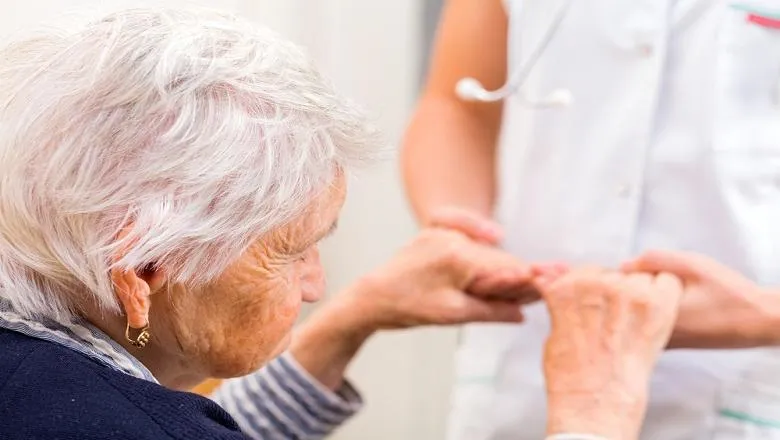Too often, people with dementia and their families struggle to access the care and support they need, their voices and concerns going unheard and overlooked. The EMPOWER Dementia Network Plus seeks to address this. We work with people affected by dementia and community groups to drive priorities and use creative approaches for researchers to work alongside to lever and sustain change for all.
Professor Catherine Evans, Professor of Palliative Care and Ageing and Honorary Consultant Nurse
09 July 2024
Addressing unequal access to dementia care
EMPOWER Dementia Network Plus aims to meet a growing need now and in the future for high-quality dementia care for all.

Researchers at King’s, alongside people with dementia, family carers, health and social care professionals and UK charities, have come together to create EMPOWER Dementia Network Plus, a new initiative that aims to empower a meaningful life for all. The network is funded by the Alzheimer's Society in partnership with the Economic and Social Research Council (ESRC) and National Institute for Health and Care Research (NIHR).
One of the core beliefs is that it is possible to live a meaningful life with dementia, but that to do so, people with dementia need to be able to access good quality dementia care. Guided by principles of co-production, putting the person before the disease, the Network aims to address inequalities in dementia care for people with complex needs and their families.
They will achieve this by:
- Creating a shared platform to connect dementia communities, people with lived experience, practitioners, policy makers and researchers to work together to bring ideas to life and lever change for equality in dementia care.
- Identifying and implementing approaches to build trusting partnerships, focusing on outreach and engagement with groups underrepresented in dementia research that seek to benefit, particularly people underserved from ethnically diverse groups, socio-economic disadvantage, with multiple conditions and severe dementia.
- Promoting equality of opportunity for inclusion in research by innovating inclusive research approaches to diversify involvement and participation in research.
- Constructing and pursuing the best system-based solutions for high-quality dementia care in collaborative small projects connecting community partners, people with lived experiences and researchers to tackle inequalities in care through understanding experiences, identifying solutions and engaging policy makers and the public to lever change.
Planned activities across the Network’s lifetime include co-created public engagement workshops, a policy lab created with the Policy Institute, a YouGov survey to understand societal knowledge, attitudes and priorities towards people with dementia and their carers and two matched funded PhDs focusing on 1) informal care costs and 2) inclusive research approaches.
Professor Catherine Evans, Professor of Palliative Care in the Faculty of Nursing, Midwifery and Palliative Care at King’s College London, is leading the Network, which spans across the Institute of Psychiatry, Psychology and Neuroscience and the Faculty of Social Science and Public Policy, as well as across the University of Hull, with Dr Emma Wolverson co-leading. Together they lead a unique collaboration, involving teams from six universities with world-leading research in dementia care, social care, primary care, public health and palliative care, to work with experts by lived experience and 11 community partners to drive meaningful change in dementia care.
This network is an exciting opportunity to find creative ways to make a difference to dementia care and to hear the voices of people who are overlooked and underserved. It is vital that we start to listen to people with dementia and those that care for them. Only by creating a conversation can we inform change that has a lasting impact.
Dr Emma Wolverson, Reader in Ageing and Dementia University of Hull and Research Lead Dementia UK
Ronald is an expert by experience living with dementia and a co-applicant of the study. Ronald says, 'I'm very interested in the subject of empowerment, especially where I have often been unheard and silenced due to feeling very scared to speak up for myself when dealing with services.
'I substantially feel that I've been disempowered due to assumptions and lack of understanding. I hope that sharing my story through the EMPOWER Dementia Network Plus helps so that others may positively learn something.'
A YouGov survey commissioned by King's researchers in 2022 identified that the public have poor awareness of the progressive and life limiting nature of dementia. Over 90% of people didn't know dementia is the leading cause of death in England, and only 42% understood that dementia is a terminal condition.
To find out more about the Network and join this call for change in dementia care for all, email EMPOWER_Dementia_Network@kcl.ac.uk
In this story
Related departments
- Florence Nightingale Faculty of Nursing, Midwifery & Palliative Care
- Cicely Saunders Institute of Palliative Care, Policy & Rehabilitation
- Institute of Psychiatry, Psychology & Neuroscience
- Faculty of Social Science & Public Policy
- Department of Child & Family Health
- Department of Adult Nursing
- Department of Mental Health Nursing
- Department of Midwifery
- Service at King’s

